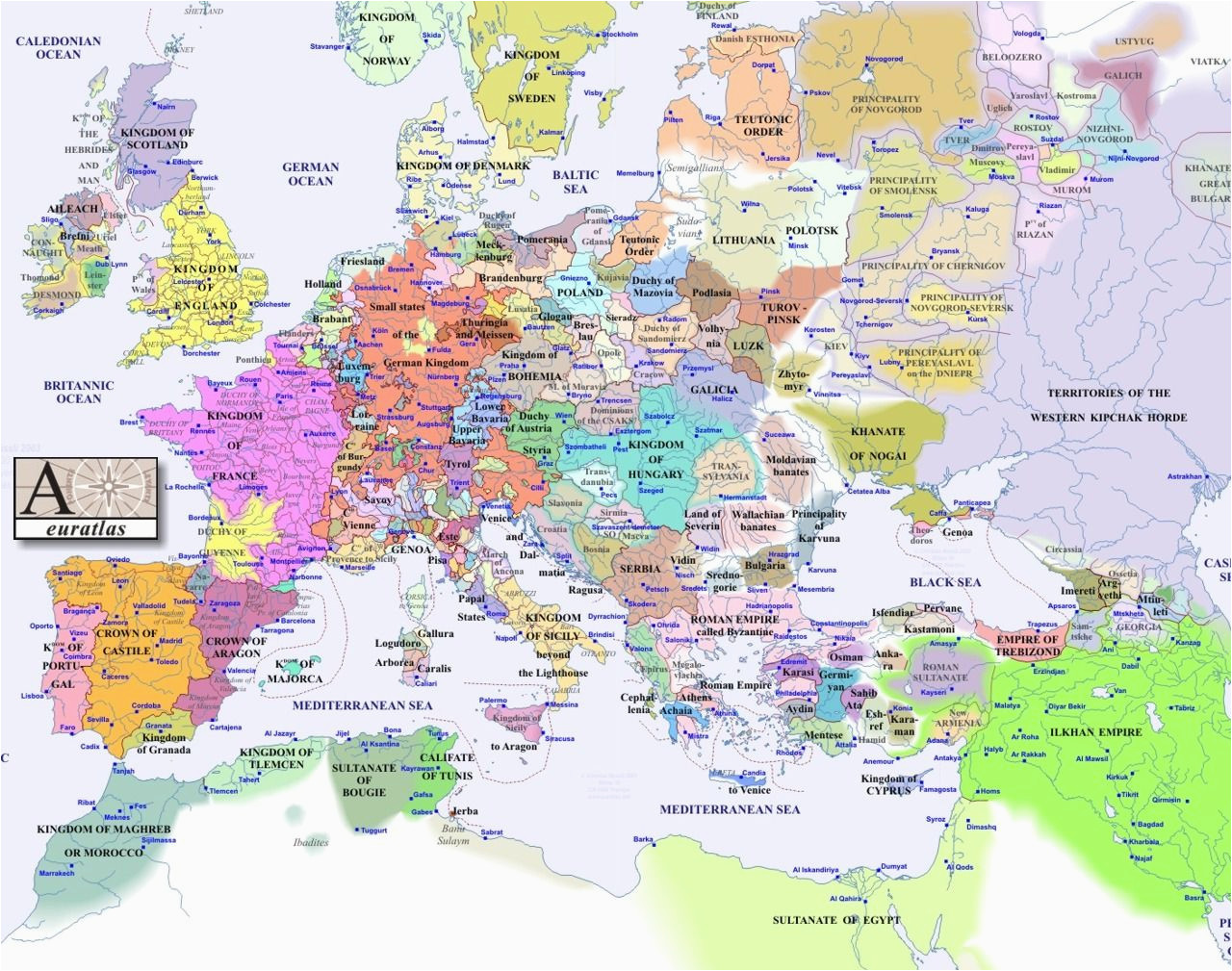Number Four in an ongoing series of articles about the historical sources, underpinnings and concepts behind Dead Air
European politics in the 14th century can be quite confusing. Luckily, most Magi don’t really care about the petty squabbles of the mundanes and their transitory tussles for temporal power. For those that do however, here is a (kinda) brief overview.
Like the Order of Hermes, Europe in 1347 is on the cusp of great change. Three major crises are starting to bring radical disruption in all areas of society: demographic collapse, political instability, and religious upheaval. The Great Famine of 1315-1317, which some attribute to a seismic shift in the Axis Magica (and others as divine retribution for the idolatry of the Baphomet by the Knights Templar) saw heavy rains spoil crops and rampant disease spread through the cities of Europe, depleting reserve food stocks and starving up to a quarter of the population to death and, although all segments of society were affected, the peasantry bore the brunt, as always.
If medieval society is split between those who pray, those who work and those who fight, those who work are definitely having the hardest time, the irony being that the fewer of them there are left, the more power those who survive might eventually command.
For those who pray, the unity of the Roman Catholic Church had been shattered by the Western Schism, and its continued suppression of heretical movements such as the Cathars, as well as burgeoning Joachimite sects like the Dulcinians at Lake Garda, led to a series of paranoid Popes seeing enemies everywhere and acting accordingly. In the early 1300s, a flare up between the Guelphs and Ghibellines brought widespread disorder across Italy, and a succession of Crusades launched by Pope Clement V, first against the Muslims in the eastern Mediterranean, then the Moors in Granada, then the Venetians in Ferrara, and finally House Guernicus at Magvillus, led to Rome becoming fractious and ungovernable, forcing Clement V to move the Papacy to Avignon, and put it under the protection and influence of the French Crown.
Popular revolts and civil wars between nobles were common, with France fighting internally many times, ongoing conflicts across the Iberian Peninsula, and the Holy Roman Empire – perhaps the most powerful European state since Charlemagne revived the title of Emperor in 800 – also in deep decline. In the aftermath of the Great Interregnum (1247–1273), the Empire lost cohesion and the separate dynasties of the various German states became more politically important than their union under an Emperor (this map is about a hundred years later than the Greater Alps Tribunal is set, but gives an idea of how European society was made up mostly of independent territories governed by landowners, rather than a centralised authority).
There were also general structural changes in how land was administered which prepared the shift of political power towards the rising bourgeoisie, at the expense of aristocratic feudalism. The rise of cities and the emergence of the new burgher class saw money increasingly becoming the common means to represent economic value in agriculture, and families such as Prima Kobe van Rijn ex Mercere’s in Antwerp made their fortunes from burgeoning international markets in wool and cloth.
The disintegration of central rule in the Empire largely happened under, and after, Frederick II (d.1250), and influential Jerbiton of the time took the opportunity to carve out territory, find sympathetic interest and help out their own mundane families. Albertus Magnus ex Jerbiton was instrumental in ensuring the duchy of Bohemia was raised to the status of an independent Kingdom. In the South, Salvestro ex Mercere and the Medici family re-asserted Florentine independence, and the Genoese Fieshi family of Opizzo ex Jerbiton and Bohemonde ex Flambeau grew their reputation; expanding both their colonies to the East and their influence within the Papal Court.
Perhaps the most important act of decentralisation for the Greater Alps Tribunal occurred in 1316, when Louis IV, Holy Roman Emperor, recognised the independence of Switzerland from the Habsburg dynasty. After lengthy negotiations led by Sourdine ex Jerbiton, Switerland’s territories were defined to almost perfectly match the Tribunal borders of the Greater Alps. Unfortunately, Louis IV died a few weeks before Tribunal, and whether the next Holy Roman Emperor will be so eager to give concessions to the Order remains to be seen, particularly as Europe once again seems to be erupting into war.
Since the withdrawal of House ex Miscellanea in around 1300, Britannia and Hibernia have been magically sealed off from the prying eyes of the Order of Hermes. Stable portals inexplicably failed (much to the consternation of Ovid ex Mercere and Marius ex Mercere) and boats carrying magi foundered or became lost in the dense fogs which covered the Channel. But in 1340, Edward III of England suddenly revived his historic claim to the European mainland, and his fleet emerged, unannounced, from the fog, and utterly destroyed the French fleet docked at Sluis. His armies then tore through Brittany and Normandy; the French troops could not stand against the devastating black powder weapons devised by Walter de Milemete ex Verditius and sold to the English by his House. By all accounts, the House Tytalus Domus Magna of Fudarus also fell to Edward III’s cannon, but the Normandy Tribunal is no longer functioning nor contactable, so confirmation is difficult.
What is confirmed is that in 1346, Edward III met King Philip VI of France on the battlefield of Crécy, and the French King and his supporters suffered a catastrophic defeat, including the deaths of King John of Bohemia, nine princes, ten counts, a duke, an archbishop, a bishop and, most tragically, a Prima; Ilduara ex Flambeau.
As Tribunal approaches, there are four main powers who may directly affect the Greater Alps; Charles IV of Luxembourg is the King of Bohemia, and the Holy Roman Emperor-presumptive since the sudden death of his enemy, Louis IV. Charles IV rules from Prague and is the eldest son and heir of John of Bohemia, who died at Crécy. Charles is also a staunch ally of the current Pope Clement VI, who still reigns from his ‘Babylonian Exile’ in Avignon, but is more independently minded and worldly than his predecessors, and certainly not as beholden to the French King, Philip VI of Valois, as they were. Philip VI himself, called ‘the Fortunate’ , has suffered a series of ruinous setbacks in the last few years. He was wounded at Crécy and, after defeat there and the ongoing siege of Calais, the Estates of France have refused to raise any more money, which has halted his plans to counter-attack by invading England. Philip’s medical faculties at the University of Paris, funded by Kalliope of Jerbiton, have also been the first to properly investigate the strange disease affecting Genoese traders coming home from the Crimea. Philip’s scholars have blamed the heavens, in the form of a conjunction of three planets in Aquarius—Mars, Jupiter, and Saturn—which they say have caused a “a deadly corruption of the air around us”. They citied Albertus Magnus, who had previously argued that a conjunction of Mars and Jupiter causes “a great pestilence in the air”, especially when they come together in a hot, wet sign, but Aurore ex Bonisagus says this is just conjecture from a man who does not understand the music of the spheres.
Finally, Edward III of Windsor, King of England seems determined to press on with his lengthy campaign on mainland Europe. If he manages to maintain a foothold at Calais, who knows how far he will push into the French and Imperial territories, and how much he truly knows about the Magical Order who enables his dominance of the battlefields of Europe. The Order of Hermes’ monopoly of black power weapons, and control of the old Templar banking networks seem more important to the temporal rulers of Europe than the fireballs, weather control and true magic of old, but they also put the Order in a precarious and more visible position than it is historically used to, not to mention stretching the interpretation of the Code – ‘Nor will I interfere with the affairs of mundanes’ – to its limits in ways never before imagined. But does any of this really matter to the ancient and powerful wizards of the Greater Alps, safe in their intransigent, immutable Covenants? Only time will tell.






